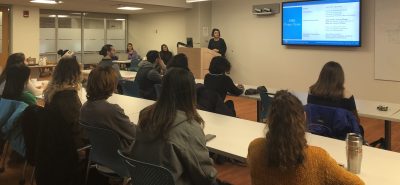On Monday, November 12, the Food and Water Security PIRE team held an informational session for students interested in joining the project as an undergraduate researcher. The event started with baked goods and coffee from the local Cafemantic eatery as the students trickled into the classroom, finding safety from the cold. After ample time to warm up and settle down the presentation began with opening words from Dr. Elizabeth Holzer, the Project Investigator, “this project is unique in its’ dual-natured approach, it is a partnership between sociologists and our environmental engineering friends”, she enthusiastically stated before introducing Dr. Zoi Dokou, Project Manager and UConn Environmental Engineering professor. “Ethiopia’s very short rainfall season coupled with the extreme hydroclimatic environment makes it a very challenging situation for the engineers to model. However, it also makes it the most valuable for the stakeholders and farmers,” Dr. Dokou states.

Dr. Dokou proceeded to give a summary of the research completed since the beginning of the project in 2016, the pending objectives to be completed by 2021 and the engineering side of the research. Her technical engineering and explanation of the models being formed for this project was contrasted with the words of PhD student, Nabil Tueme who also serves as the PIRE Undergraduate Coordinator, “we often treat scientific investigation as apolitical or value-neutral. Yet, science is a socially situated human practice.” Nabil further explained how the sociological understanding is imperative to the long-term success of the engineering solution. To capture this idea she stated the project’s goal, “how do the relationships between scientists, farmers, water managers and other authorities, influence the production, dissemination and outcome of new scientific knowledge?” and informed the undergraduate students of potential research topics, should they choose to apply.
“How can we be sure we are positively influencing these villages?” asked a student, to which Dr. Phoebe Godfrey, fellow Undergraduate Coordinator and UConn Sociology Professor answered, “intention matters; measuring positive and negative effects is very complex and that is a great question, one that sociologists seek to answer and it is certainly good grounds for your research proposal”, she states. Dr. Godfrey introduced the spring workshops that selected students would partake in before their trip to Ethiopia in June which includes linguistic training in Amharic, Ethiopia’s nationally spoken language, guest seminar speakers, engineering project highlights through sociological perspective in a reading and discussion-based format. She opened the floor to questions regarding the informational material presented. With a hand raised, current PhD environmental engineering and sociology student, Sardor Musayev asked, “Will we be having fun?”, to which the room once filled with pensive thought broke into warm laughter. “Yes, we will be learning and growing together, and that is always fun”, said Dr. Holzer. “Today is about finding out what question you personally want to be answered in the scope of this research project. It is especially unique for selected undergraduate students because you may have the opportunity to collect the data yourself in Ethiopia”. Dr. Holzer then opened the rest of the meeting to the question and answer session so undergraduates could ask their questions and talk with the current PIRE graduate students with whom they may travel in Summer 2019.
For a summary of the project and for information if you are an undergraduate, the powerpoint may be downloaded: PIRE Informational Meeting 11-12-18